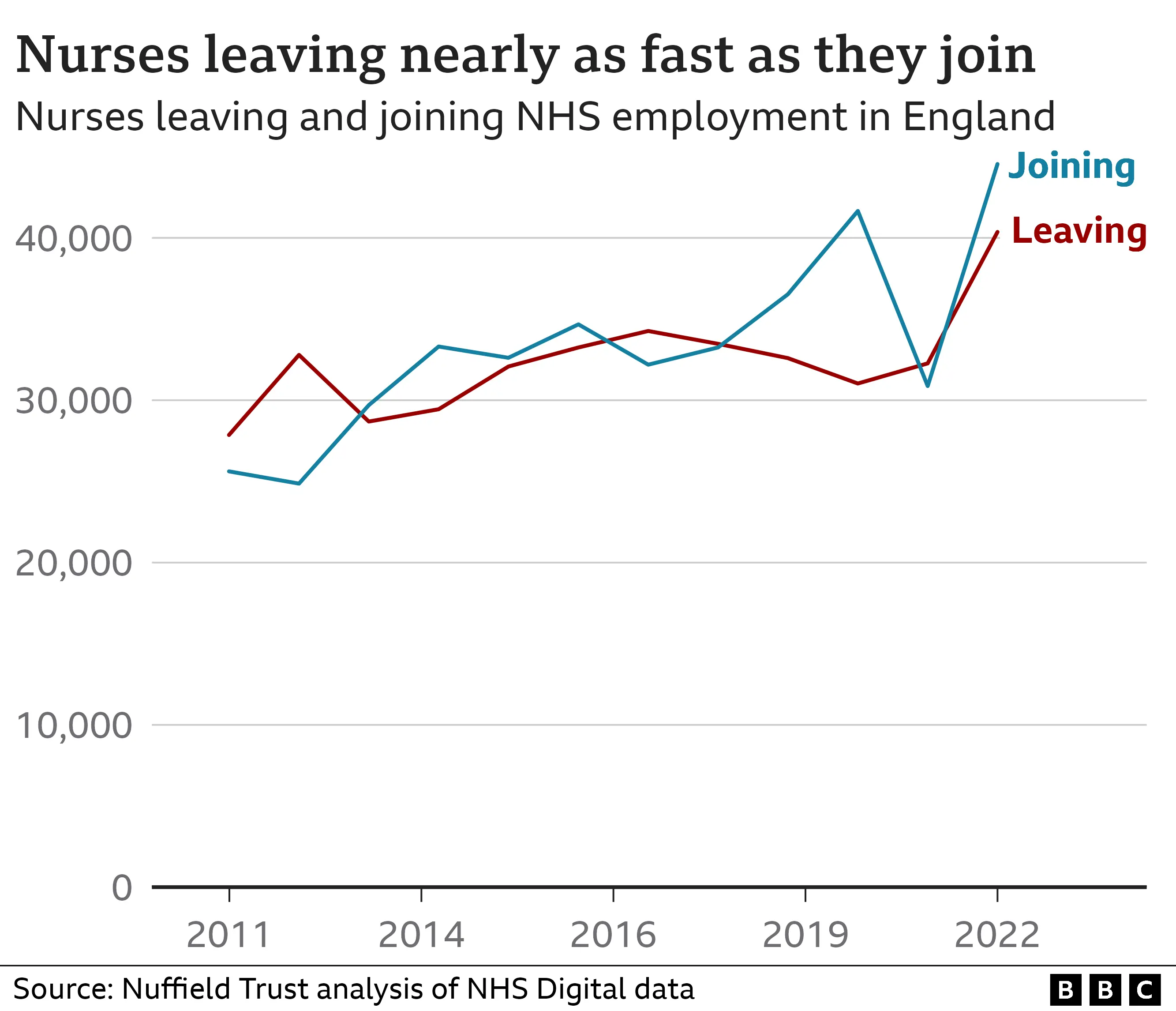Record number of nurses quitting the NHS
 Getty Images
Getty ImagesRecord numbers of nurses are quitting the NHS in England, figures show.
More than 40,000 have walked away from the NHS in the past year - one in nine of the workforce, an analysis by the Nuffield Trust think tank for the BBC revealed.
It said many of these were often highly skilled and knowledgeable nurses with years more of work left to give.
And the high number of leavers is nearly cancelling out the rise in new joiners that has been seen.
There were just 4,000 more joiners than leavers in the year to the end of June.
But a Department of Health and Social Care spokesman said progress was being made and the government was already halfway to meeting its target to increase the numbers of nurses working in the NHS in England during this Parliament by 50,000.
He said a workforce strategy would be published soon, setting out how the NHS will continue to recruit and retain nurses in the coming years.

Figures 'should be urgent wake-up call'
But the Nuffield Trust said unless something was done to stem the rise in nurses leaving, the government could struggle to hit its target.
Dr Billy Palmer, from the think tank, said there was increasing evidence stress and work-life balance were becoming key factors in nurses' decisions to quit.
He said while retirement was natural, it was "very concerning" to see evidence these other factors becoming a major driver, suggesting there were "deep-rooted issues with working practices and employment conditions".
"Nurses are integral to the functioning of the health service - it should be an urgent wake-up call," he added.
The analysis also found the rest of the UK was facing similar problems. The proportion of nurses quitting in Scotland was almost exactly the same and, while similar data is not available in Wales and Northern Ireland, other indicators suggest they are seeing significant numbers leaving.

'I left NHS to run a coffee shop'

Amanda Turpie is one of those who has left the NHS.
She was a children's cancer nurse at Leeds Teaching Hospitals NHS Trust until last year.
She left to set up a coffee shop at the end of her road after 20 years working in the health service.
Amanda says she left because of the pressures of the job and bad work-life balance.
"I was burnt out and felt I was failing the families and children I was caring for.
"I became a number in a machine. I would never leave on time and found myself often crying in the loo or car on the way home.
"I knew something had to change. The NHS is a really tough place to work at the minute.
"I think a lot of NHS staff feel unhappy."

Meanwhile, NHS managers are warning the situation could get worse as the cost-of-living crisis bites.
A report from NHS Providers said the squeeze on pay amid rising inflation is forcing nurses and other staff out of the health service or into making desperate decisions, including stopping contributions to their pension, skipping meals and taking on second jobs.
 Science Photo Library
Science Photo LibraryMiriam Deakin, of NHS Providers, said "The sad fact is some can earn more working for online retailers or in supermarkets."
She added the NHS was reaching a "tipping point" when it comes to the workforce, and the shortage of staff threatened to hamper the ability of the health service to tackle backlogs in treatment.
Latest data shows one in 10 nursing posts are vacant.
How we got the story
To understand more about what is happening within the workforce, the BBC asked the Nuffield Trust to look at data which tracks when NHS staff drop out of permanent employment.
The think tank used data provided by NHS Digital, which tracks the number of nurses joining and leaving over the course of the year.
It focuses on those in permanent roles at NHS trusts that provide hospital, community and mental health care. It does not include those working in general practice.
Nurses working in the community were the most likely to have left their job.
Those taking career breaks or going on maternity leave would both be classed as leavers.
It is not possible to tell from the data the exact reasons for leaving. But as part of the analysis, the Nuffield Trust looked at other sources of data, including research by the Nursing and Midwifery Council, which suggests work stress is becoming a key factor.
A survey by the regulator in early 2022 found just 43% who had left the register cited retirement as the reason.
Personal circumstance, too much pressure, workplace culture and leaving the UK were the most common reasons after that.

Have you left the NHS for another role? Share your experiences by emailing [email protected].
Please include a contact number if you are willing to speak to a BBC journalist. You can also get in touch in the following ways:
- WhatsApp: +44 7756 165803
- Tweet: @BBC_HaveYourSay
- Upload pictures or video
- Please read our terms & conditions and privacy policy
If you are reading this page and can't see the form you will need to visit the mobile version of the BBC website to submit your question or comment or you can email us at [email protected]. Please include your name, age and location with any submission.
